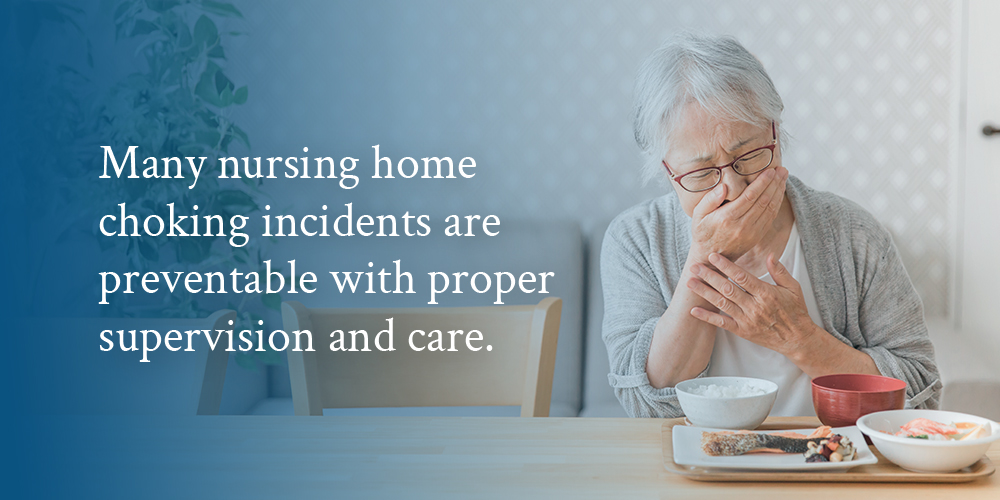
Families place their trust in nursing homes to keep their loved ones safe. This means giving residents food, medication, and daily care safely and with respect. One danger that is sometimes overlooked is choking. Choking can lead to serious injury or death in a matter of minutes, and nursing homes are expected to take reasonable steps to prevent it.
If your loved one has been injured or died from choking in a nursing home, you may wonder whether the facility failed in its responsibilities. The answer depends on the facts, but Illinois law is clear: nursing homes owe their residents a duty of care. When facilities do not follow safety standards, they can be held legally responsible.
At Nursing Home Injury Center, our Peoria nursing home injury lawyers handle these cases with the resources of a large firm and the close, personal attention of a small division. We offer free consultations and work on a contingency basis, so you do not pay unless we recover compensation for your family.
Why Choking Is a Major Risk in Nursing Homes
Choking is one of the leading causes of preventable injury and death among older adults. Age-related health conditions such as Parkinson’s disease, dementia, or stroke can make swallowing difficult. Some residents may also take medications that affect muscle control or how much saliva they make, which increases the risk. Even something as simple as poorly prepared food can create choking hazards.
Nursing home staff are trained to recognize these risks. They should check residents for swallowing problems, sometimes called dysphagia. If a resident has difficulty swallowing, they should have a care plan. This might mean changing food textures, supervising meals, or arranging for speech therapy to help with swallowing techniques. When facilities fail to take these precautions, they put residents in danger.
Illinois Nursing Homes’ Legal Duty of Care
Under the Illinois Nursing Home Care Act (210 ILCS 45/), nursing homes must provide residents with adequate care and protect them from avoidable harm. This includes harm caused by choking. Facilities are required to learn each resident’s needs and adjust their care accordingly. If a resident has known swallowing difficulties, the home must take steps to minimize the risk.
Federal regulations also impose standards through the Centers for Medicare & Medicaid Services. These rules require nursing homes to have adequate supervision and help with eating and drinking to prevent avoidable accidents. Ignoring these duties can have tragic consequences.
Common Causes of Choking in Nursing Homes
Choking incidents in nursing homes often result from a combination of negligence and poor supervision. For example, a resident may be given food that does not match their diet. A person who needs soft foods or thickened liquids may be served hard or dry foods that are difficult to swallow. In other cases, staff may not watch residents during meals even though they know supervision is required.
Mistakes with medicine can also play a role. Pills that are too large or not properly crushed may cause blockages in the throat. Staff may also rush residents through meals or fail to respond quickly enough when choking begins. In some tragic cases, staff members are not trained in the Heimlich maneuver or CPR, delaying life-saving interventions.
Families should pay close attention to how their loved ones are cared for at mealtimes. When these issues are ignored, they can turn into medical emergencies. Warning signs that a nursing home may not be taking choking risks seriously include:
- Residents eating alone despite known swallowing problems
- Meals that do not have the correct texture
- Not enough supervision in the dining room
- Repeated episodes of coughing, gagging, or choking
If your family member chokes, document everything. Medical records, incident reports, and witness statements can show whether the facility followed procedures. A nursing home injury attorney can investigate these details and determine whether you have a valid claim.
How Liability Is Established for Nursing Home Choking Accidents
To hold a nursing home responsible, you will need to show that the facility’s actions or failures directly caused the choking injury or death. This means looking closely at your loved one’s care plans, the nursing home’s staff training, and compliance with state and federal regulations. Expert witnesses such as medical professionals or nursing home administrators may be necessary.
If the evidence shows that the home ignored clear risks, served unsafe meals, failed to supervise, or delayed emergency response, the facility may be found negligent. In Illinois, damages can include medical expenses, pain and suffering, and in fatal cases, wrongful death compensation.

The Cost of Nursing Home Choking Injuries
Even when choking does not lead to death, the consequences can be severe. Lack of oxygen, even for a few minutes, can cause traumatic brain injury. Residents may need hospitalization, intensive care, or rehabilitation. This can be very expensive and difficult for families, especially after watching a loved one suffer.
When a choking death happens, families face not only grief but also questions about whether it could have been prevented. If a loved one suffered from a choking death that could have been prevented with the right care from the nursing home, families can take legal action. A claim will usually cover funeral expenses and any medical care before death, and might also include pain and suffering for the family.
Contact a Peoria, IL Nursing Home Wrongful Death Lawyer
Choking in nursing homes is not just an unfortunate accident. In many cases, it is the result of negligence and a lack of appropriate care. If your loved one has been injured or killed in a choking incident, you have the right to seek accountability.
At Nursing Home Injury Center, we help protect nursing home residents and their families. With the resources of a large firm and the close attention of a dedicated division, we fight for justice in every case.
Call our Peoria County, IL nursing home choking injury attorneys at 309-524-6900 to schedule your free consultation. We will listen to your story, explain your legal options, and pursue compensation on your behalf. Because we work on a contingency basis, you will not owe us anything unless we recover damages for you.



